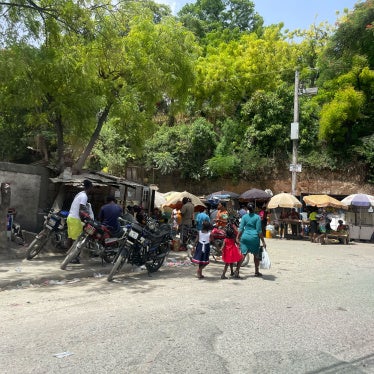It was nighttime in Parc Marie Vincent when the five men grabbed her, Gentile told Human Rights Watch researchers. A few short weeks after losing her home in the earthquake, she was in a packed camp for the quake survivors when she was kidnapped, raped, beaten and forced to perform oral sex.
When the earthquake hit Haiti in January, the scale of the devastation shocked the world. Over 200,000 people killed, and 1.2 million uprooted. Entire agencies, government and private, gone. The scope and depth of the tragedy seemed beyond belief.
But at least one aspect of the disaster should have come as no surprise: the heightened risk of violence and exploitation women would face in the aftermath. No less horrifying for being expected, the brutality women suffer in such situations has been documented over and over again, from the 2004 Indian Ocean tsunami to Gulf Coast post-Hurricane Katrina.
When Human Rights Watch visited Haiti the month after the quake, threats to women were already apparent. There was no lighting and little security in the camps. The emergency shelters provided no privacy, forcing women to bathe and dress in public view. Trips to the toilets in the dark of night were made more dangerous by the lack of sex-segregated facilities.
Even as Haitian authorities and relief agencies rallied to address these issues, the risks turned into terrifying reality for some women. Women reported being raped and brutally beaten in those early weeks after the quake, and months later, increased levels of sexual violence continue.
Knowing that these dangers exist in emergency situations underlines the need for concerned and capable governments such as the United States to take the lead in responding. The International Violence Against Women Act, a bill before the House Foreign Affairs committee, would have the United States do just that in a broad range of situations involving violence against women.
U.S. Rep. Ileana Ros-Lehtinen, R-Miami, the ranking minority member on the committee, and her colleagues on both sides of the aisle should act without delay to move this important legislation forward.
The bill, known as IVAWA, sets out a road map for preparedness. Drawing on decades of lessons learned about how to prevent and respond to violence against women, the bill would create a structure to coordinate U.S. efforts for the greatest possible impact. For disaster situations, it provides for the State Department to help expand the capacity of international humanitarian organizations to protect women and girls.
In addition to targeting prevention, the act identifies the crucial elements needed to support survivors of sexual violence-both immediate and long-term. And this is just one element of a comprehensive vision for addressing the many forms of violence against women around the globe. Using a holistic approach, the bill calls for improving legal protection to prevent and respond to violence, working to change public attitudes, promoting economic opportunities for women and expanding access to education.
The bill would write into law the position of ambassador-at-large for global women's issues, to make sure that U.S. programs are integrated, coordinated and evaluated to maximize their effectiveness. Certainly, it is an ambitious agenda. But it is a smart one, too.
It is an agenda long overdue. We know about violence against women. We have seen too many times the dangers women face in disaster situations. We know what it takes to be prepared. Now, it is time to do what it takes to halt the violence.








